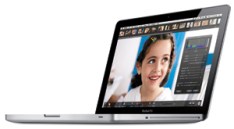 It’s been nearly three months since Apple released its 1.7 firmware update to address performance limiting issues with the initial 1.6 firmware that shipped with the latest 13″ and 15″ MacBook Pro notebooks. The 1.6 firmware limited interface speeds of SATA II drive to just 1.5 Gbps instead of the full spec speed of 3.0 Gbps.
It’s been nearly three months since Apple released its 1.7 firmware update to address performance limiting issues with the initial 1.6 firmware that shipped with the latest 13″ and 15″ MacBook Pro notebooks. The 1.6 firmware limited interface speeds of SATA II drive to just 1.5 Gbps instead of the full spec speed of 3.0 Gbps.
The documentation provided with the 1.7 firmware update notes that:
MacBook Pro EFI Firmware Update 1.7 addresses an issue reported by a small number of customers using drives based on the SATA 3Gbps specification with the June 2009 MacBook Pro. While this update allows drives to use transfer rates greater than 1.5Gbps, Apple has not qualified or offered these drives for Mac notebooks and their use is unsupported.
The key phrasing here is “Apple has not qualified or offered these drives for Mac notebooks and their use is unsupported.” Given that the latest 13″ and 15″ MacBook Pros have a SATA II interface and that most HDDs and SSDs use a SATA II interface, this wording by Apple is quite peculiar. The SATA II interface is after all a storage standard that is used by nearly every new notebook and desktop computer sold today.
Considering that a 128GB SSD option on a 13″ MacBook Pro is going for $400, many owners have purchased cheaper alternatives from the likes of OCZ and Patriot which offer Indilinix-based SSDs that offer performance that rival Intel’s X-25M lineup. These Indilinx drives are also much faster than the Samsung-supplied SSDs offered by Apple. However, owners are finding out that Apple’s implementation of the SATA II specification on 13″ and 15″ MacBook Pro models coupled with the “fixed” 1.7 firmware are causing a lot of headaches.
An 89-page thread on the Apple Discussion forums tells the tale of numerous users battling with SATA II SSDs not originally supplied by Apple and also with traditional SATA II HDDs from the likes of Western Digital, Seagate, and Toshiba. User IanBurrell, the 13″ MacBook Pro user that started the original thread on June 23, detailed his problems with a 320GB HDD that he took from an older MacBook to put in his new machine, “After the firmware update yesterday, the machine has started freezing randomly; the spinner comes up sometimes when reading or writing to the drive. The hard drive, a WD Scorpio Blue, supports SATA II. My suspicion is that there are intermittent data errors when using the SATA 3 Gbps interface. It could be an incompatibility between the controller and drive or the ribbon cable isn’t good enough for newer SATA.”
Vitaeergo confirmed these issues with a post stating, “I had an Intel X25 installed in my new (2 days old) MBP 15 which worked splendidly before the update. Afterwards, the MBP won’t even recognize the drive, although I can use the drive in other machines.”
User mvillarreal posted this morning, “A couple of days ago i upgraded the HD of my Macbook Pro unibody with a Western Digital Scorpio Blue WD5000BEVT 500GB 5400 RPM 2.5″ SATA 3.0Gb/s. And i stared to have the same problem as everybody. The MBP works fine most of the time but something triggers a pause in the hard drive, monitoring with the Active Monitor when copying a 34 Gb file, the hard drive does to 0 for about 15 to 20 sec. every 1.8 to 2 Gb copied.”
Some users, however, are even having problems with their SATA II drives that were originally supplied with their MacBooks after performing the 1.7 firmware update. “I’m experiencing the freezing (spinwheel etc) very often as well, but I just have the standard 250gb hard drive that comes in the high end 13 inch macbook pro. It only started after the firmware upgrade, too. Does that make sense,” noted 13″ MacBook Pro user Kevin222.
Apple has still not responded to user complaints over the SATA II issues — in fact, some users have even gone so far as to use an unsupported 1.7 firmware-to-1.6 firmware downgrade tool to bring their machines back to “safer” 1.5 Gbps SATA I transfer speeds.
Some users have speculated that the problem is simply a poorly designed SATA cable between the HDD/SSD and the motherboard or a faulty SATA II implementation that Apple fails to acknowledge. Previous MacBooks and MacBook Pros using the NVIDIA GeForce 9400M platform don’t have these SATA II issues, so the latter could be possible.
Despite the problems, Apple remains mum about the issues and doesn’t appear to be willing to talk about them or a possible fix.


